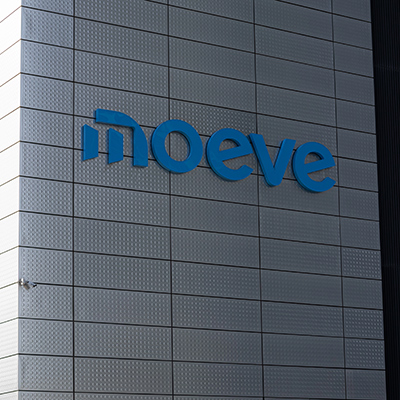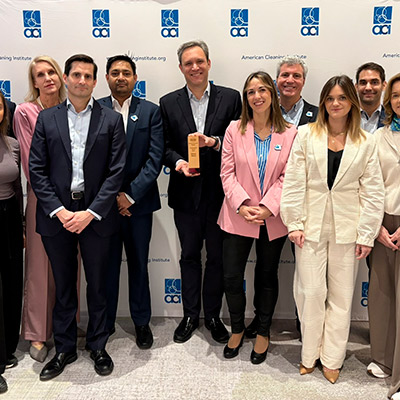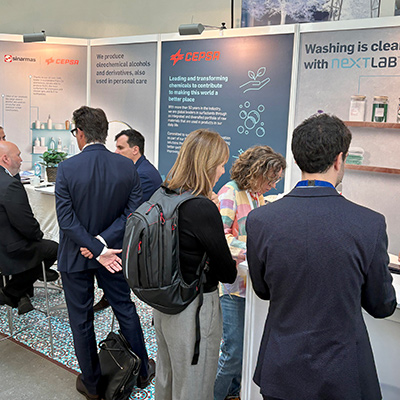- Cepsa's NextLab Low Carbon represents a reduction of 19% in the carbon footprint compared to the traditional LAB, from the origin of the raw material to the manufacture of the product, according to the preliminary results of the Comparative Product Carbon Footprint carried out by the Company.
- AENOR has certified the traceability of sustainable production with renewable heat used at the Cepsa plant in Puente Mayorga (Spain) and is part of the pioneering certification system developed by the company to guarantee the production of NextLab Low Carbon.
- Cepsa Química's Canadian plant began producing NextLab Low Carbon globally for the first time in 2023 for the American market. Now, and thanks to its good reception, the Company has replicated the model for the first time for Europe and Asia from its production plant in Spain, which will contribute to reducing the carbon footprint of the biodegradable detergents that include it in their formulations.
Cepsa Química has just launched its new product NextLab Low Carbon for Europe and Asia. NextLab Low Carbon is produced by decreasing plant emissions during the production process thanks to the use of renewable heat instead of conventional fossil fuels.
This process, pioneer in the chemical sector, makes it possible to obtain a product with the same characteristics, qualities, properties and performance as traditional LAB, but with lower greenhouse gas emissions and, therefore, more environmentally friendly than those produced with fossil fuels.
Specifically, and according to the results of the Comparative Product Carbon Footprint promoted by the Company and on a cradle-to-gate basis, NextLab Low Carbon's greenhouse emissions is 19% lower than those produced by LAB made with fossil energy.
For the first time ever, in 2023, Cepsa Química manufactured NextLab Low Carbon at its plant in Canada to supply the American market. Now, for the first time, the company will start manufacturing this product for the European and Asian markets from its Puente Mayorga plant. The facility, located in southern Spain, is one of the most important worldwide in the chemical industry and was the first factory in the world to adopt the innovative Detal Flex 2-phenyl technology, which increases the plant's efficiency and safety while improving its sustainability, reducing environmental impact, and optimizing LAB production.
In the words of Vice-President Global Surfactants, Carlos Molina, the production of Nextlab Low Carbon for the European and Asian markets “means working even more closely with our customers and thus meeting the needs of those seeking to accelerate their decarbonization and produce detergents with less impact on the environment. It is also a step forward in achieving Cepsa Química's environmental and decarbonization objectives. These objectives are embodied in the Positive Motion strategy, with which we want to develop a green and sustainable chemistry, and which will allow us to reach our climate neutrality in 2050”.
Cepsa Química is the world's leading manufacturer of LAB, the most widely used product in the production of biodegradable detergents, accounting for around 18% of global production. More than 60% of the biodegradable detergents on the market, both domestic and industrial, use LAB in their formulations. Its excellent properties, its effectiveness, as well as its processability and compatibility with other ingredients, make it a very useful element in the washing process, both in traditional products (powder or bar detergent) and in more sophisticated products (single-dose capsules or highly concentrated liquid detergents).
Pioneers in the development of a new Certification System
Cepsa Química has developed a new certification system to trace GHG emission reductions of scope 1+2 and produce NextLab-Low Carbon, in the absence of external certification systems at national and/or international level (recognized or harmonized) on the production of chemical products using renewable heat and conventional raw materials. This new certificate is designed to ensure traceability of sustainable production using renewable energy instead of conventional fossil fuels. The certification system and its corresponding registration are audited by a third party.
In the case of the Cepsa Química Puente Mayorga plant, the traceability of sustainable production with renewable energies to reduce emissions from operations has been certified by the Spanish Association for Standardization and Certification (AENOR).
In addition, although the certification system initially targeted Lineal Alkylbenzene production, it can be applied to other products and stablish the standards of the Homecare Industry, encouraging companies to put in place new initiatives to reduce carbon emissions during the production process.
With the commercial launch of NextLab Low Carbon in Europe and Asia, Cepsa Química continues its commitment to making the Home Care Industry more sustainable and contributing to the decarbonization of its activity and the protection of the planet.



